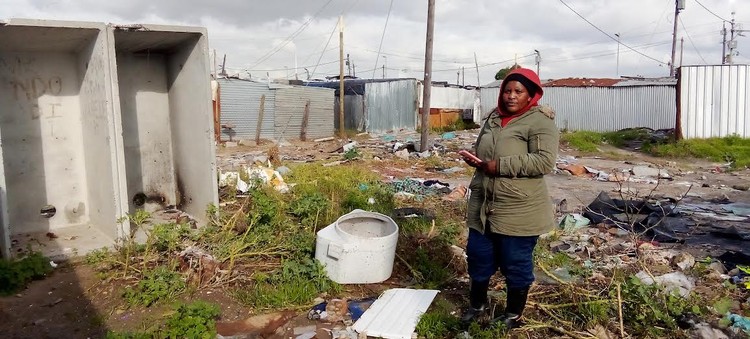Families here relieve themselves in plastic bags which they throw into the drains
In Lusaka informal settlement in Cape Town there are not enough toilets, drains are blocked, and there is a terrible stench
Buyiswa Mgavu says the settlement desperately needs more toilets. Photos: Chris Gilili
- Some families in Lusaka informal settlement in Cape Town have resorted to relieving themselves in plastic bags which they throw into the drains.
- Drains are blocked, rubbish litters the streets and there is a severe shortage of communal chemical toilets. Doors to many toilets are broken.
- The City of Cape Town says the ward councillor has not reported a shortage of toilets.
- But residents say they have discussed the problem with him many times.
A desperate shortage of communal toilets in Lusaka informal settlement in Nyanga, Cape Town, has led families to relieve themselves in plastic bags or buckets and dump the waste in the drains next to the road.
Many of the toilets don’t have doors, and there are no taps for people to wash their hands.
Drains are blocked with food, nappies and used condoms. The stench follows you around when you walk. Rubbish is strewn all over the main road, and smelly stagnant water lies in the paths. Children play around the dirt.
Residents say the City of Cape Town no longer supplies municipal refuse bags to the overpopulated informal settlement near the N2, which was started in 1989 by backyarders from Gugulethu.
“We don’t have enough toilets in Lusaka. Many people still need access to toilets. They rely on relieving themselves in a plastic bag or using a bucket and dumping it in the drains. As a result our drains are always blocked. It is very embarrassing but we have got used to this kind of life,” said resident Buyiswa Mgavu.
“These toilets were installed around 2016 and they are never repaired. We are pleading with the City of Cape Town to give us additional toilets. No matter how frequently the City empties them, they are simply not enough.”
“People are not coping. There are too many people living here. We are squashed inside these shacks.”
Rubbish is strewn across the roads.
Kwayiyo Mangaliso, a long time resident of Lusaka, said, “As you can see this place is covered in filth. We don’t know what is going on and the municipality is not informing us. People have resorted to throwing their rubbish anywhere they can. I have stayed in Lusaka for over 30 years now, but our lives have not improved. We have been failed by people we trusted and our complaints have fallen on deaf ears.”
Another resident, Khayalethu Msana, said, “Sometimes you are relieving yourself and someone can see you naked because most toilets don’t have doors. We live like animals in Lusaka, as you can see.”
“My mother stayed under these harsh conditions and passed away staying here. Now we are subjected to this. We have no choice, but to stay still and wait.”
Many of the communal toilets have no doors.
The City’s Mayco Member for Water and Sanitation, Councillor Zahid Badroodien, told GroundUp that a shortage of communal toilets had not been reported to the City. He said the ward councillor was responsible for applying for additional toilets and residents should talk to him. “Once the application is received, a thorough investigation will be conducted, and a response will be provided,” he promised.
Ward 40 councillor Bongani Ngcombolo (ANC) said he was not aware of a shortage of toilets in Lusaka. He said he would investigate.
But Mgavu said the councillor had been informed of the problem.
“He knows about the toilet issue and in the past he promised us that he was going to talk to the City of Cape Town to help. We have spoken to him as committee leaders and during meetings.”
On the issue of refuse bags, Badroodien said the contract for the issue of the bags had been terminated because of poor performance and the City was getting new quotes for supplies.
In the meantime, the City had sourced black refuse bags from its stores and would start delivering at least one per household.
Support independent journalism
Donate using Payfast

Don't miss out on the latest news
We respect your privacy, and promise we won't spam you.
Next: Major court victory for trade union
Previous: Reality show cleared of inciting domestic violence and hatred
© 2023 GroundUp. This article is licensed under a Creative Commons Attribution-NoDerivatives 4.0 International License.
You may republish this article, so long as you credit the authors and GroundUp, and do not change the text. Please include a link back to the original article.
We put an invisible pixel in the article so that we can count traffic to republishers. All analytics tools are solely on our servers. We do not give our logs to any third party. Logs are deleted after two weeks. We do not use any IP address identifying information except to count regional traffic. We are solely interested in counting hits, not tracking users. If you republish, please do not delete the invisible pixel.



